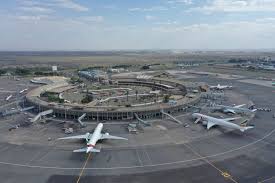Navigating the various names for Jomo Kenyatta International Airport (JKIA) can be a bit confusing. Is it JKIA, JKIA Airport, or simply NBO? Each version serves a different purpose, from local shorthand to international coding, reflecting the complexity of aviation naming conventions.
In this guide, we’ll unravel the different names used for Nairobi’s primary airport, explaining the nuances behind each term. We’ll dive into why JKIA is commonly used in Kenya, why some people refer to it as JKIA Airport (despite the redundancy), and why the IATA code is actually NBO, not JKIA. Whether you’re a frequent flyer or a curious traveler, this guide will clarify the naming conventions that define one of Africa’s busiest airports.
Let’s break it down! Jomo Kenyatta International Airport is abbreviated as JKIA. You’d think that’s all we need, right? But you often hear people say “JKIA Airport”, which sounds redundant—like saying “ATM Machine” or “PIN Number.” So, why does it happen?
Short History of JKIA Naming
Jomo Kenyatta International Airport (JKIA) is named after Jomo Kenyatta, Kenya’s first president and a prominent figure in the country’s fight for independence. Kenyatta, often referred to as the “Father of the Nation,” played a key role in leading Kenya to independence from British colonial rule in 1963. The airport was renamed in his honor to commemorate his leadership and lasting legacy in shaping the nation.
JKIA’s Original Name; Embakasi Airport
Originally, the airport was called Embakasi Airport, named after the neighborhood in which it is located. It was officially opened in 1958, during the colonial period, serving as Nairobi’s main international gateway.
Embakasi Airport Renamed JKIA in 1978
The name change from Embakasi Airport to Jomo Kenyatta International Airport occurred in 1978, the same year Jomo Kenyatta passed away. This renaming was part of Kenya’s broader effort to honor national heroes and assert post-colonial identity, marking a significant shift in the country’s history and its move away from its colonial past.
Thus, the name JKIA stands as a tribute to Jomo Kenyatta’s critical role in Kenya’s independence and nation-building efforts.
Read full history of JKIA here.
Why “Airport” is Included to “JKIA”
Here’s the catch: in natural language, we often add familiar words to make things crystal clear. While frequent travelers know “JKIA” refers to the airport, adding “Airport” makes it unmistakable for others. It acts as a clarifier, letting anyone know it’s not a business park or secret government facility (which JKIA could easily stand for in a different context).
Lexical Semantics: Clarification vs. Redundancy
Technically speaking, this is a case of lexical clarification—where adding an extra word doesn’t change the meaning but reinforces it in context. In casual speech, people prefer to be extra clear rather than risk confusion. So “JKIA Airport” is akin to wearing a belt with suspenders—it’s a bit much, but you’re definitely not going to slip up.
Our Smart Branding of “JKIAirport.com”
Now let’s talk about our website JKIAirport.com, which perfectly avoids the clunky repetition. By combining “JKIA” and “Airport,” they’ve created a seamless, intuitive name without falling into the trap of saying Jomo Kenyatta International Airport Airport.
This clever combination provides clarity without redundancy, making it a great example of semantic economy—it’s efficient, it works, and it’s easy to understand.
Why People Still Say “JKIA Airport”
Ultimately, people say “JKIA Airport” because it’s a linguistic cushion. It helps those unfamiliar with the abbreviation know for sure that we’re talking about Kenya’s main aviation hub. So, while “JKIA” on its own would suffice, “JKIA Airport” is a little extra clarity for good measure. And our website JKIAirport.com nail the balance between abbreviation and clarity without any awkward repetition.
That’s how we land on “JKIA Airport”—a blend of convenience, clarity, and a touch of redundancy for good measure!
Why is JKIA’s Airport Code “NBO” and Not “JKIA”?
Why JKIA’s IATA Code is “NBO” and Not “JKIA”
Airport codes serve as a universal shorthand in aviation, but they can often differ from what travelers expect. When it comes to Jomo Kenyatta International Airport (JKIA), many first-time travelers might wonder why the official IATA code is NBO instead of something that directly reflects its local abbreviation, like “JKIA.” Let’s break it down.
What Are Airport Codes?
There are two types of codes that airports use globally: IATA codes and ICAO codes. These codes are standardized to provide a quick, consistent way for airlines, travel agents, and passengers to identify airports worldwide.
- IATA Code: This is the more commonly recognized three-letter code used by the general public, passengers, and airlines for ticketing and baggage purposes. These codes are assigned by the International Air Transport Association (IATA).
- ICAO Code: This four-letter code is used primarily for air traffic control and airline operations. The International Civil Aviation Organization (ICAO) assigns these codes.
See list of all airport codes here.
Why is JKIA’s IATA Code “NBO” and Not “JKIA”?
1. The IATA Standard for Airport Codes
The IATA assigns three-letter codes to airports based on various criteria, including geographical names, cities, or other unique identifiers. The key here is that these codes typically reflect the city the airport serves rather than the specific name of the airport itself.
In the case of Jomo Kenyatta International Airport, the airport serves Nairobi, Kenya’s capital. The code NBO was derived from this, with “N” representing Nairobi and the rest following a logical sequence. The aim is to make the code internationally recognizable and easy to associate with the city it serves, even if the airport’s official name differs.
If “JKIA” were to be used, it would create potential confusion, as most people (especially international travelers) might not instantly recognize it as the airport serving Nairobi. Hence, the IATA system emphasizes clarity and ease of association for major international hubs.
2. Legacy and Historical Precedents
IATA codes are also subject to historical conventions. Jomo Kenyatta International Airport wasn’t always called JKIA. Before its renaming in honor of Kenya’s first president, the airport was known as Embakasi Airport, and the three-letter IATA code NBO was already in use, tied to Nairobi. Changing such a well-established code, particularly for a major international airport, would create logistical nightmares for airlines, airports, and passengers worldwide. Thus, it made sense to keep NBO in place even after the airport’s renaming.
3. Why “JKIA” Wasn’t Assigned as the Code
While it might seem logical to use the abbreviation “JKIA” as the IATA code, airport codes often avoid directly mirroring airport names, especially when the name consists of more than three letters. Additionally, using JKIA would deviate from the IATA’s established convention of city-based airport codes. As JKIA is named after a person rather than a city or geographic feature, it makes sense that the IATA code reflects the city (Nairobi) and not the airport’s full name.
Moreover, “JKIA” would break the IATA’s format of concise three-letter identifiers, which are intentionally designed to be short and easy to remember.
Understanding the ICAO Code: HKJK
In contrast to the IATA code, JKIA’s ICAO code is HKJK. ICAO codes are four letters long and often reveal more about a country and region. In this case:
- HK refers to airports in Kenya.
- JK represents Jomo Kenyatta, forming a more specific identifier for air traffic control and operations.
This system helps distinguish between different airports within the same country. Unlike the IATA system, which prioritizes the city or metropolitan area, the ICAO code can be more specific to the airport’s name.
Why “NBO” Works Better for Travelers
The IATA code system is built to make international travel more seamless. For example:
- When booking flights or handling luggage, it’s much easier to use a city-based code like NBO because travelers globally can immediately recognize it as “Nairobi’s airport.”
- “JKIA” is a local designation, and while it’s well-known within Kenya and parts of Africa, it doesn’t have the same global resonance as NBO.
Why is it “NBO” and Not “NAB”?
While it might seem logical for Nairobi’s IATA code to be “NAB” (since “o” comes after “b” in “Nairobi”), the actual code is NBO for several important reasons:
- Pre-existing Code for “NAB”: The IATA code NAB was already assigned to a now-closed airport in Albany, Georgia, USA. Since IATA codes must be unique, Nairobi couldn’t use NAB, even though it might seem like a natural choice.
- Historical Assignment and Availability: When the IATA was assigning codes, NBO was available and chosen to represent Nairobi. These codes aren’t always a direct reflection of letter order in a city’s name but are instead based on availability and practicality.
- Distinctiveness and Recognition: NBO is a distinctive, easy-to-recognize code that clearly represents Nairobi on a global scale. The code’s uniqueness helps avoid confusion with other cities, enhancing travel and logistical coordination.
Thus, NBO is the IATA code for Jomo Kenyatta International Airport, balancing practicality and historical assignments, while NAB was already claimed by the Albany, Georgia airport.
Other Names for Jomo Kenyatta International Airport (JKIA)
While Jomo Kenyatta International Airport is the official name, it’s common for people to refer to it by different variations. These alternatives tend to reflect either familiarity or cultural shorthand, much like how “JKIA” has become an abbreviation. Let’s explore some of these other names:
1. Nairobi Airport
Some travelers and locals alike refer to it simply as Nairobi Airport. Since JKIA is the largest and busiest airport in Kenya’s capital, the term “Nairobi Airport” is widely accepted, even if it’s not entirely accurate—technically, Wilson Airport also serves Nairobi. However, when people say “Nairobi Airport,” they’re almost always referring to JKIA because of its prominence and international significance.
2. Jomo Kenyatta Airport
Another common shorthand is Jomo Kenyatta Airport. It omits the “International” part, which is understandable in casual conversations or for people familiar with it. Given that many large airports around the world are named after national figures (think Charles de Gaulle Airport in Paris or John F. Kennedy Airport in New York), dropping the “International” doesn’t cause confusion in most cases.
3. NBO
For those in the aviation industry or frequent flyers, NBO is the IATA code for Jomo Kenyatta International Airport. This three-letter code is used in flight bookings, baggage tags, and airport signage. It’s especially handy for travelers or airline staff who need a quick reference without getting bogged down in the longer names. The use of IATA codes is universal and crosses language barriers, making NBO one of the most efficient ways to refer to the airport globally.
4. Embakasi Airport
Now here’s a historical gem! Before being renamed in honor of Kenya’s first president, Jomo Kenyatta, the airport was originally called Embakasi Airport, after the area where it’s located. Older generations of Kenyans or long-term Nairobi residents sometimes still refer to it by this name out of habit or nostalgia. It’s a nod to the airport’s history before its expansion and modernization.
5. Kenya’s Gateway
Some people, especially in tourism and marketing circles, might call it Kenya’s Gateway, reflecting its crucial role in connecting Kenya to the rest of the world. While this is more of a descriptive or symbolic name than a practical one, it highlights JKIA’s importance as the main entry point for international travelers coming to explore Kenya’s attractions like the Masai Mara, the coast, and beyond.
Why These Names Persist
The variations in names reflect different relationships people have with the airport. For international travelers, NBO is quick and efficient. For Nairobi locals, Jomo Kenyatta Airport is just as natural as JKIA. And for those interested in Kenya’s history, Embakasi Airport reminds them of its earlier days.
No matter which name you use, they all point to the same bustling hub that connects Kenya to the world, with each name carrying a little piece of the airport’s history or role in everyday life.

